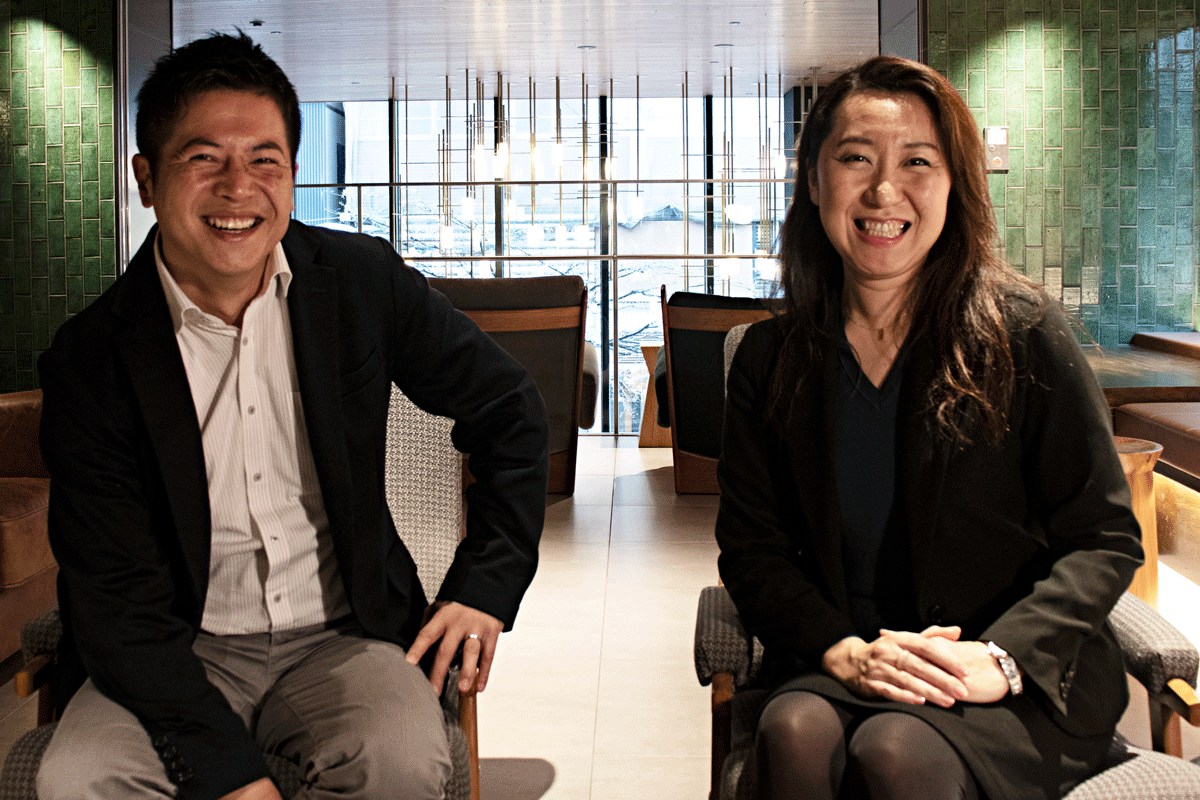While working on NION’s Berlin x Tokyo 2019 event, core team member Maike not only had the chance to stay at the Royal Park Canvas in Ginza for three nights, she also met hotel manager Hiroko Seki, the first and only woman in her company in such a position, and auditor Katsumi Sugawara. They talked about a new hospitality style, equality and innovative working time models in Japan, and the positive influences of having lived abroad.
Since I’ve come to Tokyo for the first time, I’ve always stayed at shared apartments, later at friend’s homes or even had my own little place when I lived there for six months. I’ve spent nights in hotels or ryokans while exploring other Japanese cities, but I never did so in Tokyo – and I was also never there for work. Last year, both things were different.
2019 was the 25th anniversary of the close citizen friendship between Berlin and Tokyo, which also extends to the fields of art and subculture. On November 29, we did celebrate this special connection at the city’s beloved club, Circus Tokyo, and focused on the well deserved rise of female artists in Japanese and German club culture. On behalf of the German Embassy, we brought together great women from both cities who are not only successful DJs, but also support diversity in club culture by speaking out and taking action. Which lead to a discussion panel on the night before the party, titled ‘Creating togetherness in club culture‘, that was live streamed on the popular culture platform Dommune.
As it was part of my job to take good care of the wonderful DJs from Berlin, Sarah Farina and DASCO, I had the opportunity to stay in a hotel in Tokyo for the first time.
A warm and welcoming mood all over the place
Thanks to Space Design, we will spend three nights at the Royal Park Canvas, located in Ginza, an area well known for its variety of high quality bars, restaurants and shops. Nevertheless it’s a great surprise that I can find the incense sticks, that I’ve been yearning for since a long time, as they once had been a present and aren’t available outside of Japan, only five minutes away from the hotel at the amazing Shoyeido store. Quite a good start of my time at the hotel.
The Royal Park Canvas is situated in a small side street and has a very welcoming entrance hall with wooden furniture, where everything is bathed in soft and warm light. Basics like shampoo, conditioner and shower gel are available in the rooms, but the other usual amenities and some drinks like coffee and tea are provided in the hall via a self-service counter. I really like this waste avoiding and space saving approach, and who needs a shower cap anyway?
The elevator brings you either to the cozy lounge on the second floor, to the restaurant on the top of the building or to one of the 120 guest rooms. Not so many for a hotel in Ginza, but this provides a more personal atmosphere, which I always prefer. You might never find me on an oceanic liner or at typical mass tourism locations.
The mood in the room is just as warm as in the reception hall: a lot of wood, modern sliding doors as a soft reminder of ancient Japanese times, and quite a few discreet, partly dimmable light sources. When I decide to sleep, it actually takes me a while until I find every switch to lay down in the dark, covered by an extremely fluffy blanket. How was I ever supposed to get up again?
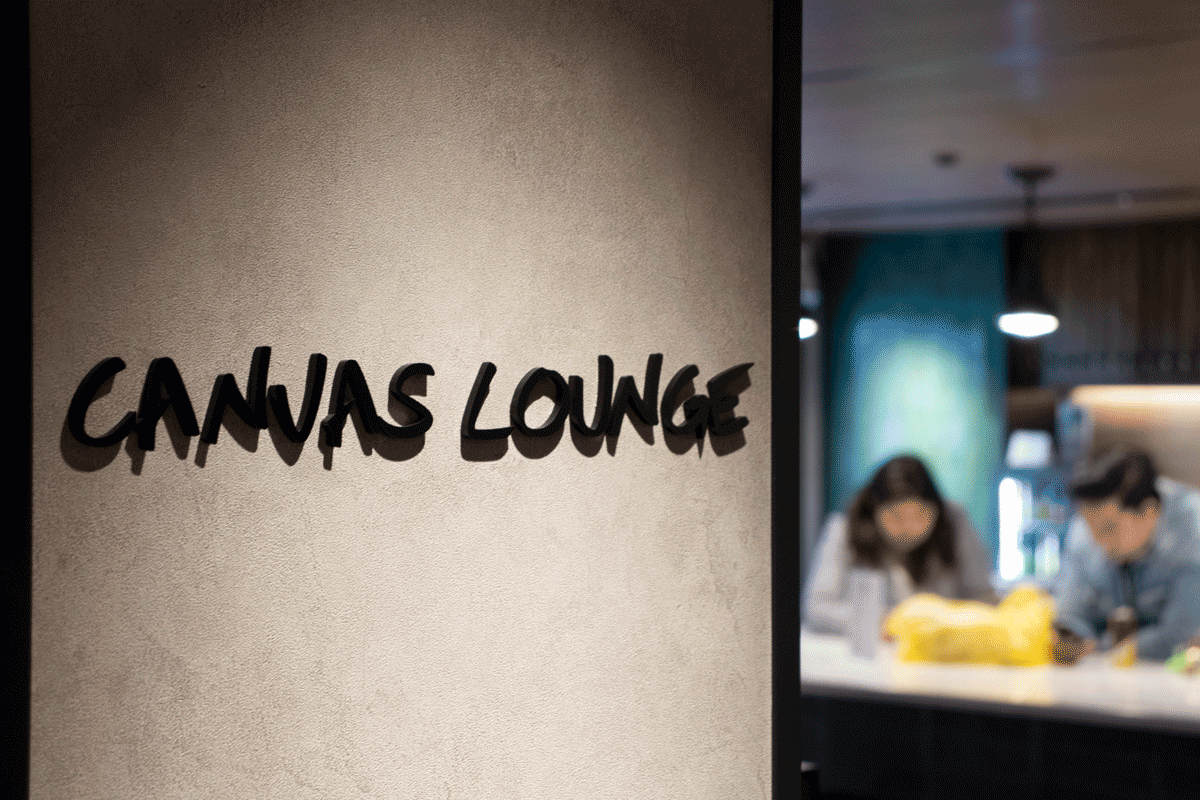
Fortunately, the next morning, right after a delicious breakfast with lots of fruits and vegetables accompanied by a fine soul music selection and a view all over Ginza, I have an appointment with Katsumi Sugawara, auditor of Space Design and Hiroko Seki, first and only female manager at the Royal Park Hotel chain. I’m quite curious to hear what this means for her in a still male-dominated society like Japan, because issues such as equality and empowerment play an important role in all aspects of my life.
Besides, I want to know more about the Royal Park Canvas, which seemed a little bit different than classic hotels. Hiroko Seki explains to me that it’s even different than most of the other hotels of the Royal Park chain, where they usually offer a full service. Not so at the Canvas in Ginza, where the focus lies on millenials who have different expectations and put more emphasis on style, but still want to feel very comfortable and welcomed. Most of the guests are in Tokyo for leisure and not for work. “So we not only want to offer them a room, we want to make something happen!” says Hiroko, smiling. “We not only say hello and goodbye, we try to create something for the guests and let them make new experiences.”
In fact, the atmosphere at the lounge, where we are sitting and talking is also very welcoming and warm, pleasant house music is playing in the background, modern art pieces hang on the walls, and guests can choose between different styles of armchairs or couches and make themselves really comfortable, grab a fashionable journal from the magazine rack or even hang out in the music corner, surrounded by a huge variety of vinyls and music related books. I could spend all day here, listening to music while working, and lose track of time.
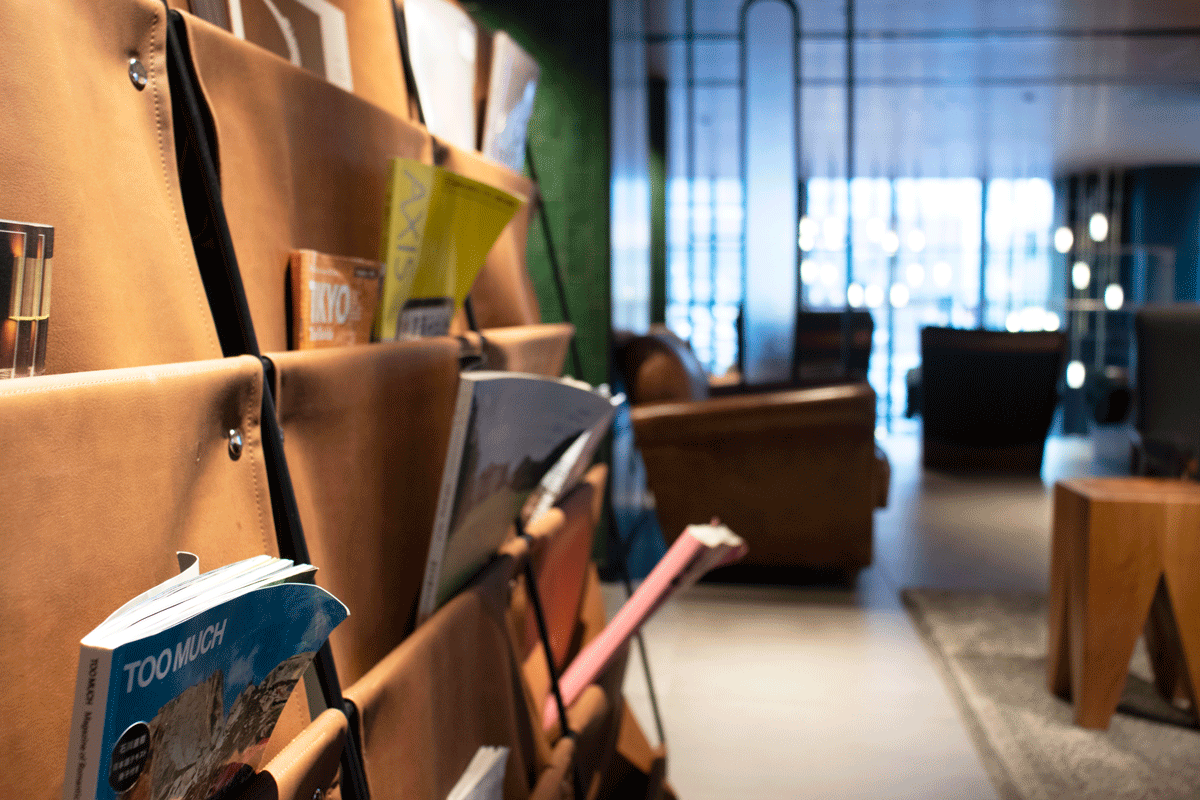
Katsumi tells me, that the design idea of the Royal Park Canvas was a collaborative work between designers and architects, who even went to New York for research where they realized that people want to maintain lifestyle also while staying at a hotel, which lead to a cross cultural interpersonal concept.
Although they don’t offer any suites at the Royal Park Canvas, there are two special rooms, created by two different designers – one was also responsible for the layout of the lobby, the other for the design of the restaurant. And as Ginza was originally an area for very traditional culture such as Kabuki, the creators of the hotel wanted to follow up that tradition by spreading culture and lifestyle. So there is also art all over the place, like patterned puzzle pieces, shaped and coloured layers out of metal, and even an installation, “Sound Shower” by Lyota Yagi, presented on the lounge floor, close to the elevators. From the shower head comes white noise which amazingly has a very calming effect on me. And I’m not the only one who enjoys it. Hiroko tells me, that especially the younger generation and open minded people love the shower. “Many people stop by, listen to the white noise, ask about it – it’s one of our communication tools to interact with the guests! I don’t know if this was intended, but it works great.”
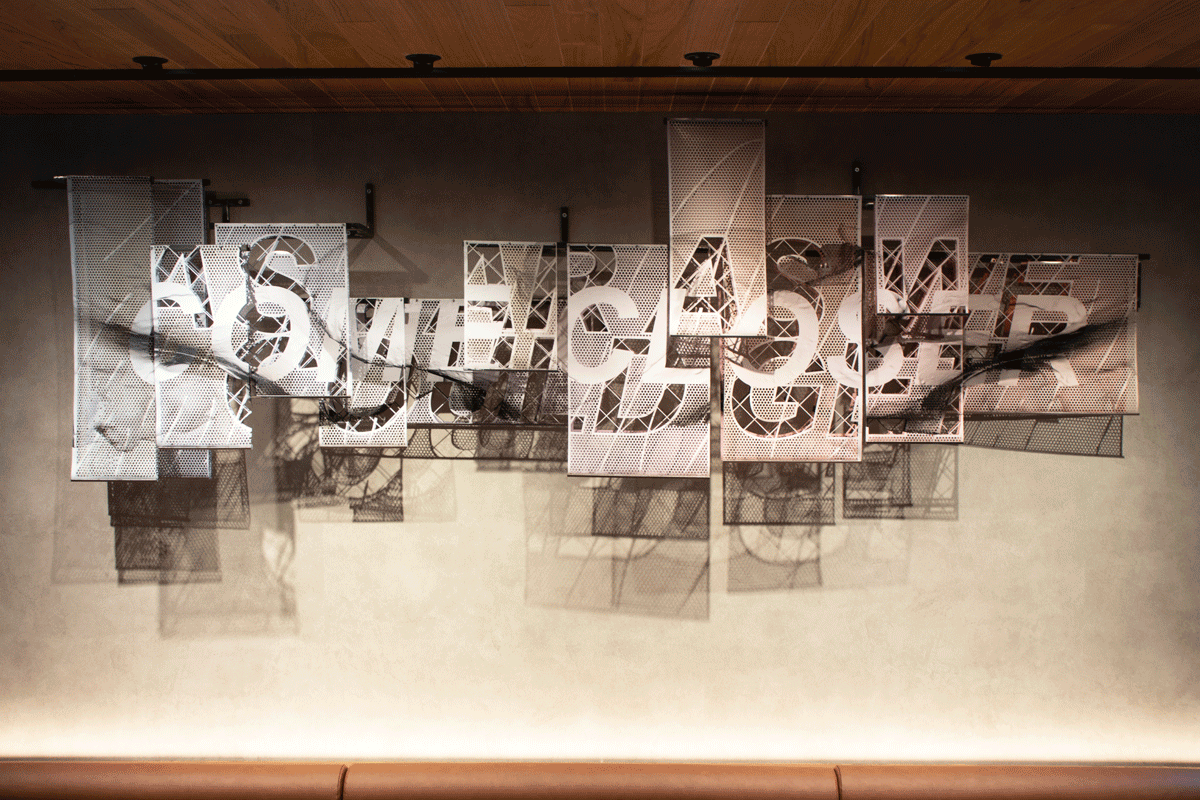
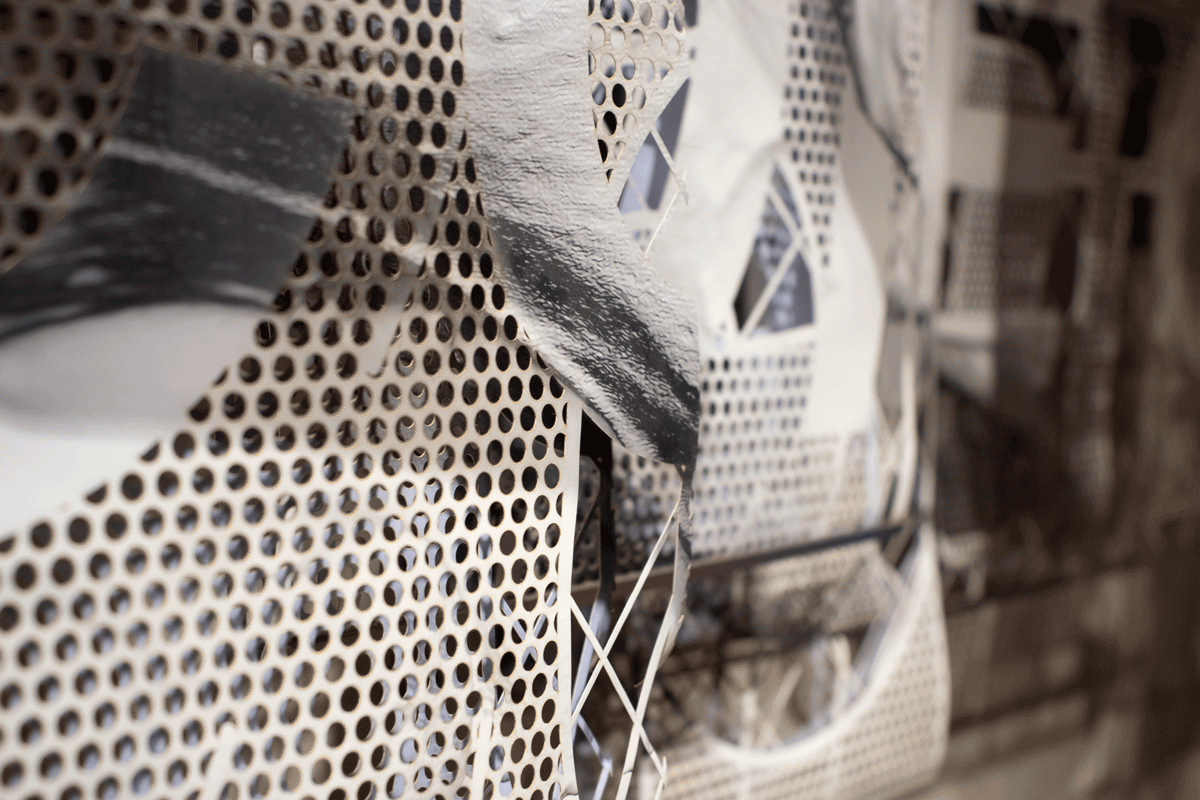
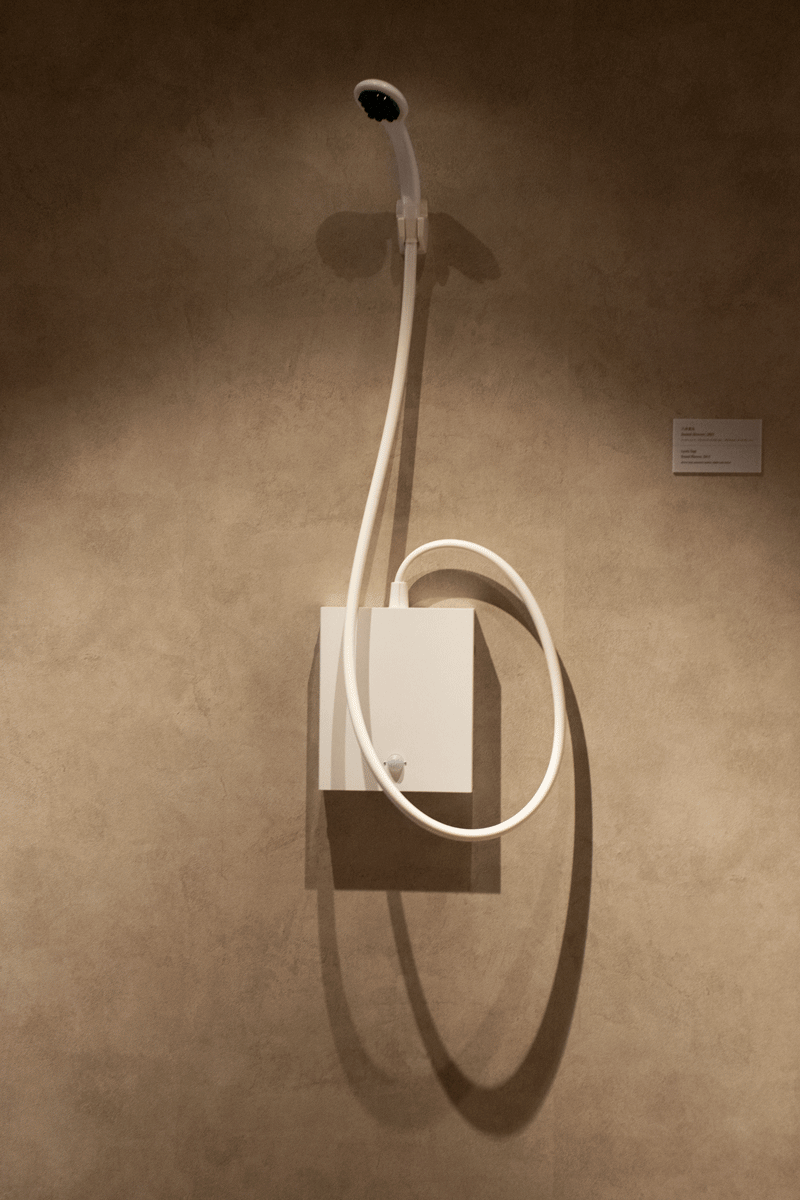
“And we want people make experiences through the art.” adds Katsumi. “It can be seen not only from one side but from different angles. It shows you various perspectives. This is what we mean by the concept of Make it happen and what we see as a new style.”
We have fun. We think local. We are connected. is how their concept continues. It relates primarily to the events that take place regularly at the Royal Park Canvas and which are free and open for everyone. Often, musicians or DJs perform and the hotel offers special drinks, sometimes also in collaboration with local brands. But they also organize events that are more related to Japanese culture such as tea ceremonies, flower arrangement shows, or a tanabata celebration. Recently there was even a rakugo event, where a Japanese story was told in English.
One of Hiroko’s favorite events was when drag queens came over, either to serve drinks or to just party and spread good vibes. “I’m very open to the queer community and want to be inclusive” she says. Actually, you can find rainbow colored puzzle pieces next to the toilet sign on the lounge floor. A strong signal, as the discussion about unisex toilets is unfortunately still going on all over the world.
Asked, if the hotel wants to become a bigger player in Tokyo’s nightlife, Katsumi explains to me the situation in Japan: “It seems as if a lot would happen here, but it’s limited. It might also be because the transport system is always closed during the night and thus nightlife is maybe a little bit less active compared to other countries.” He would like to contribute though, for instance by organizing bar hopping tours and arranging events that link to other communities to create more impact. “Unfortunately, we can’t have big and loud parties because it would disturb the guests upstairs.”
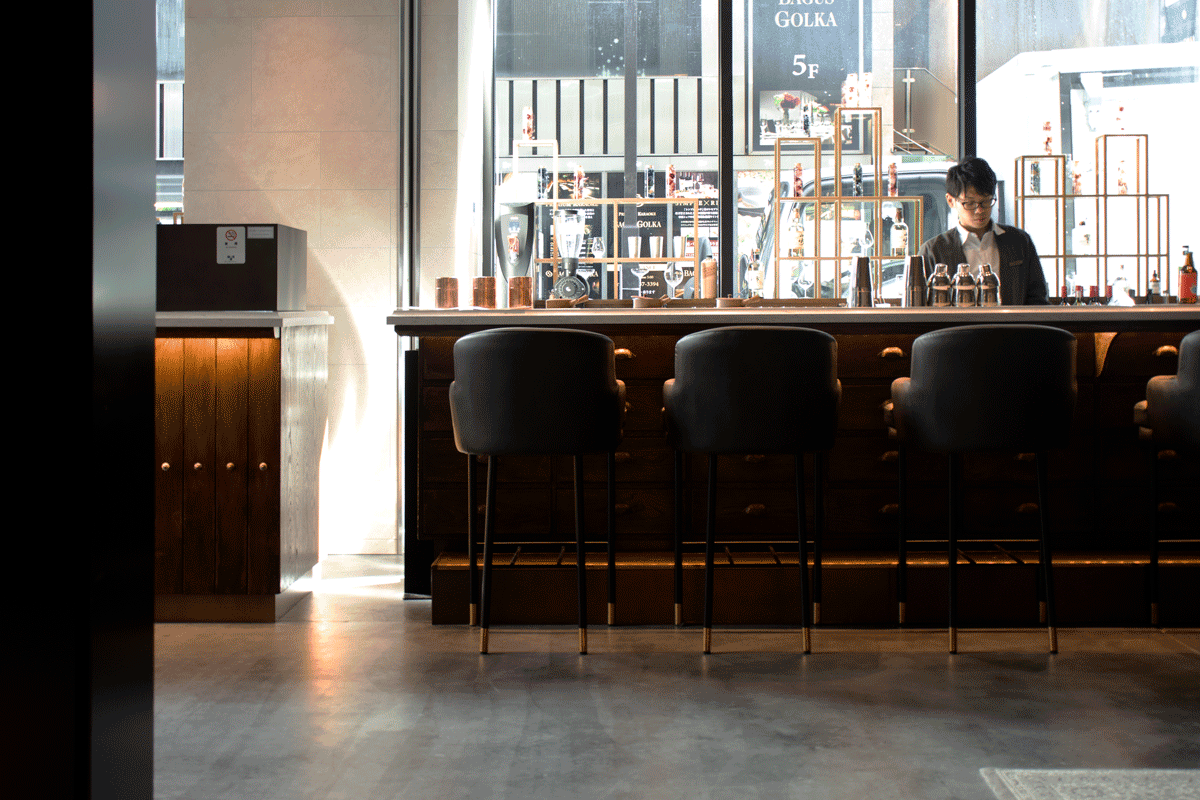
Working women, flexible hours – and what about paternity leave?
Hiroko is the first and only female hotel manager in her company. “In my group the number of women in management positions is limited so far.” she says. “But I think in five or ten years, there will be also many active women in higher positions, because the ladies of the younger generation are working very hard.” She also adds, that although the Japanese hotel industry is a men’s world since a long time, she’s not experiencing any difficulties. “I also don’t feel any challenges – but I’m still single, so I don’t have to take care of my own family.”
In Japan, like many other countries, the men of the older generation expect women only to take care of the children, but Hiroko believes in change. She observes, that younger fathers also want to be with their children and thus want to stay at home.
“Not only women, men also have to take care of their families by making money and are not really free – but I’m free!” she laughs, and I know exactly what she means. You have less responsibility and thus can focus on the things you like.
Katsumi chuckles and states that the situation at Space Design, which administers the hotel chain but also offers serviced apartments and serviced offices, is different.
“More than 60 percent of the employees at Space Design are women, half of them came back from maternity leave and are now working mothers. Recently, there have been even male workers who took paternity leave.” I’m surprised, and even more excited about their working models with flexible or less hours and the possibility to work from home. It really gives me hope that we live in times when things change for the better.
“This flexible model could also apply when you need to look after your parents as they have become older. Right now, Space Design is in an exciting experimental phase.”
Opening up and learning from other cultures
Both, Katsumi and Hiroko, are very open minded, and I’m curious if this might have something to do with their experiences of living and working abroad. Katsumi has worked in Canada and Dubai and says, this has changed him a lot. “There are so many different people from different cultures with different economic backgrounds and different survival strategies! By working with them I learned to become receptive and patient.” He explains, that Japan is such a tiny island and most people have the same background. “But they must learn to open up and accept other cultures.”
Hiroko has worked in Singapore and Hanoi, and loves traveling around Asia and Europe.
“My mindset has changed while I was working abroad. It was a very great experience for me and I would be a different person, if I wouldn’t have done that.” In Vietnam and Singapore, the middle and higher management is full of women. “For me it was a big experience that it didn’t matter if it was a woman or a man you are working for.”
She also mentions the Japanese work style: “Here, people are always focused on working, working, working. But in the other countries, they enjoye more aspects of life. So during work time abroad I was still focused on work, but at other times I enjoyed my life, which was totally new for me.”
This sounds beautiful and life changing to me, who was always intimidated by Japanese working style – some people get sick or even die because of it. But how easy has it been for Hiroko to maintain this newly won attitude after her return to Tokyo?
“Actually, I have to work hard.” she admits. “But for example, when it comes to annual holidays, many people feel sorry, when they take their days off. For me, it’s very important though. If I don’t have my holidays, I have no life. Working hard is crucial, it’s a good Japanese point, but enjoying the other parts of life is also important.”
And she adds another thing she has learned to appreciate while working abroad. Although the service style might have not always been totally professional, the employees always knew how to take good care of everybody, including children, elder people, disabled people. “In Vietnam, they have big families and thus a lot of training! Not so in Japan.”
Hiroko resumes “For me, it’s very easy to get along with people from other countries and appreciate our differences.” I totally agree with her. Having lived abroad changes a lot about how you interact. I’m also working with people from various countries and sometimes we experience misunderstandings because of our backgrounds and different ways of expression. Learning that and accepting the differences is an ongoing process, that I appreciate a lot because it changes your perspective and helps you to grow.
“It’s like with the art pieces here at the hotel!” Katsumi says, and we all start laughing with pleasure. I’m very grateful that they both helped to enrich my first hotel experience in Tokyo. ありがとうございました。

